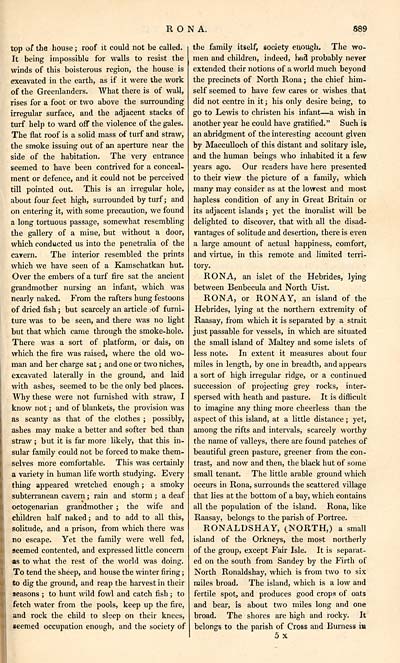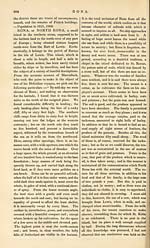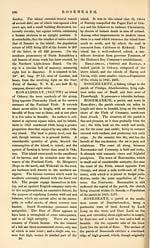Gazetteer of Scotland > Volume 2
(409) Page 889
Download files
Complete book:
Individual page:
Thumbnail gallery: Grid view | List view

R O N A.
889
top uf the house ; roof it could not be called
It being impossible for walls to resist the
winds of this boisterous region, the house is
excavated in the earth, as if it were the work
of the Greenlanders. What there is of wall,
rises for a foot or two above the surrounding
irregular surface, and the adjacent stacks of
turf help to ward off the violence of the gales.
The flat roof is a solid mass of turf and straw,
the smoke issuing out of an aperture near the
side of the habitation. The very entrance
seemed to have been contrived for a conceal-
ment or defence, and it could not be perceived
till pointed out. This is an irregular hole,
about four feet high, surrounded by turf; and
on entering it, with some precaution, we found
a long tortuous passage, somewhat resembling
the gallery of a mine, but without a door,
which conducted us into the penetralia of the
cavern. The interior resembled the prints
which we have seen of a Kamschatkan hut.
Over the embers of a turf fire sat the ancient
grandmother nursing an infant, which was
nearly naked. From the rafters hung festoons
of dried fish j but scarcely an article -of furni-
ture was to be seen, and there was no fight
but that which came through the smoke-hole.
There was a sort of platform, or dais, on
which the fire was raised, where the old wo-
man and her charge sat ; and one or two niches,
excavated laterally in the ground, and laid
with ashes, seemed to be the only bed places.
Why these were not furnished with straw, I
know not ; and of blankets, the provision was
as scanty as that of the clothes ; possibly,
ashes may make a better and softer bed than
straw ; but it is far more likely, that this in-
sular family could not be forced to make them-
selves more comfortable. This was certainly
a variety in human life worth studying. Every
thing appeared wretched enough ; a smoky
subterranean cavern ; rain and storm ; a deaf
octogenarian grandmother ; the wife and
children half naked ; and to add to all this,
Solitude, and a prison, from which there was
no escape. Yet the family were well fed,
seemed contented, and expressed little concern
as to what the rest of the world was doing.
To tend the sheep, and house the winter firing ;
to dig the ground, and reap the harvest in their
seasons ; to hunt wild fowl and catch fish ; to
fetch water from the pools, keep up the fire,
and rock the child to sleep on their knees,
seemed occupation enough, and the society of
the family itself, society enough. The wo-
men and children, indeed, had probably never
extended their notions of a world much beyond
the precincts of North Rona ; the chief him-
self seemed to have few cares or wishes that
did not centre in it ; his only desire being, to
go to Lewis to christen his infant — a wish in
another year he could have gratified." Such is
an abridgment of the interesting account given
by Macculloch of this distant and solitary isle,
and the human beings who inhabited it a few
years ago. Our readers have here presented
to their view the picture of a family, which
many may consider as at the lowest and most
hapless condition of any in Great Britain or
its adjacent islands ; yet the moralist will be
delighted to discover, that with all the disad-
vantages of solitude and desertion, there is even
a large amount of actual happiness, comfort,
and virtue, in this remote and limited terri-
tory.
RONA, an islet of the Hebrides, lying
between Benbecula and North Uist.
RONA, or RONAY, an island of the
Hebrides, lying at the northern extremity of
Raasay, from which it is separated by a strait
just passable for vessels, in which are situated
the small island of Maltey and some islets of
less note. In extent it measures about four
miles in length, by one in breadth, and appears
a sort of high irregular ridge, or a continued
succession of projecting grey rocks, inter-
spersed with heath and pasture. It is difficult
to imagine any thing more cheerless than the
aspect of this island, at a little distance ; yet,
among the rifts and intervals, scarcely worthy
the name of valleys, there are found patches of
beautiful green pasture, greener from the con-
trast, and now and then, the black hut of some
small tenant. The little arable ground which
occurs in Rona, surrounds the scattered village
that lies at the bottom of a bay, which contains
all the population of the island. Rona, like
Raasay, belongs to the parish of Portree.
RONALDSHAY, (NORTH,) a small
island of the Orkneys, the most northerly
of the group, except Fair Isle. It is separat-
ed on the south from Sandey by the Firth of
North Ronaldshay, which is from two to six
miles broad. The island, which is a low and
fertile spot, and produces good crops of oats
and bear, is about two miles long and one
broad. The shores are high and rocky. It
belongs to the parish of Cross and Burness is
5x
889
top uf the house ; roof it could not be called
It being impossible for walls to resist the
winds of this boisterous region, the house is
excavated in the earth, as if it were the work
of the Greenlanders. What there is of wall,
rises for a foot or two above the surrounding
irregular surface, and the adjacent stacks of
turf help to ward off the violence of the gales.
The flat roof is a solid mass of turf and straw,
the smoke issuing out of an aperture near the
side of the habitation. The very entrance
seemed to have been contrived for a conceal-
ment or defence, and it could not be perceived
till pointed out. This is an irregular hole,
about four feet high, surrounded by turf; and
on entering it, with some precaution, we found
a long tortuous passage, somewhat resembling
the gallery of a mine, but without a door,
which conducted us into the penetralia of the
cavern. The interior resembled the prints
which we have seen of a Kamschatkan hut.
Over the embers of a turf fire sat the ancient
grandmother nursing an infant, which was
nearly naked. From the rafters hung festoons
of dried fish j but scarcely an article -of furni-
ture was to be seen, and there was no fight
but that which came through the smoke-hole.
There was a sort of platform, or dais, on
which the fire was raised, where the old wo-
man and her charge sat ; and one or two niches,
excavated laterally in the ground, and laid
with ashes, seemed to be the only bed places.
Why these were not furnished with straw, I
know not ; and of blankets, the provision was
as scanty as that of the clothes ; possibly,
ashes may make a better and softer bed than
straw ; but it is far more likely, that this in-
sular family could not be forced to make them-
selves more comfortable. This was certainly
a variety in human life worth studying. Every
thing appeared wretched enough ; a smoky
subterranean cavern ; rain and storm ; a deaf
octogenarian grandmother ; the wife and
children half naked ; and to add to all this,
Solitude, and a prison, from which there was
no escape. Yet the family were well fed,
seemed contented, and expressed little concern
as to what the rest of the world was doing.
To tend the sheep, and house the winter firing ;
to dig the ground, and reap the harvest in their
seasons ; to hunt wild fowl and catch fish ; to
fetch water from the pools, keep up the fire,
and rock the child to sleep on their knees,
seemed occupation enough, and the society of
the family itself, society enough. The wo-
men and children, indeed, had probably never
extended their notions of a world much beyond
the precincts of North Rona ; the chief him-
self seemed to have few cares or wishes that
did not centre in it ; his only desire being, to
go to Lewis to christen his infant — a wish in
another year he could have gratified." Such is
an abridgment of the interesting account given
by Macculloch of this distant and solitary isle,
and the human beings who inhabited it a few
years ago. Our readers have here presented
to their view the picture of a family, which
many may consider as at the lowest and most
hapless condition of any in Great Britain or
its adjacent islands ; yet the moralist will be
delighted to discover, that with all the disad-
vantages of solitude and desertion, there is even
a large amount of actual happiness, comfort,
and virtue, in this remote and limited terri-
tory.
RONA, an islet of the Hebrides, lying
between Benbecula and North Uist.
RONA, or RONAY, an island of the
Hebrides, lying at the northern extremity of
Raasay, from which it is separated by a strait
just passable for vessels, in which are situated
the small island of Maltey and some islets of
less note. In extent it measures about four
miles in length, by one in breadth, and appears
a sort of high irregular ridge, or a continued
succession of projecting grey rocks, inter-
spersed with heath and pasture. It is difficult
to imagine any thing more cheerless than the
aspect of this island, at a little distance ; yet,
among the rifts and intervals, scarcely worthy
the name of valleys, there are found patches of
beautiful green pasture, greener from the con-
trast, and now and then, the black hut of some
small tenant. The little arable ground which
occurs in Rona, surrounds the scattered village
that lies at the bottom of a bay, which contains
all the population of the island. Rona, like
Raasay, belongs to the parish of Portree.
RONALDSHAY, (NORTH,) a small
island of the Orkneys, the most northerly
of the group, except Fair Isle. It is separat-
ed on the south from Sandey by the Firth of
North Ronaldshay, which is from two to six
miles broad. The island, which is a low and
fertile spot, and produces good crops of oats
and bear, is about two miles long and one
broad. The shores are high and rocky. It
belongs to the parish of Cross and Burness is
5x
Set display mode to: Large image | Transcription
Images and transcriptions on this page, including medium image downloads, may be used under the Creative Commons Attribution 4.0 International Licence unless otherwise stated. ![]()
| Gazetteers of Scotland, 1803-1901 > Gazetteer of Scotland > Volume 2 > (409) Page 889 |
|---|
| Permanent URL | https://digital.nls.uk/97435730 |
|---|
| Description | Volume II: Glenbanchor to Zetland. |
|---|---|
| Attribution and copyright: |
|
| Description | By Robert Chambers and William Chambers. Glasgow: Blackie & Son, 1838. 2 volumes. |
|---|---|
| Shelfmark | NF.1461.g.7 |
| Additional NLS resources: | |

